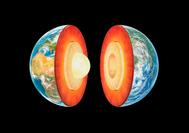|
|
General
Geology |
|
||
|
|
|
Home I Syllabus I News and highlights I Notes, materials I Websites I Lectures I Laboratories I Main site | Backup site |
||
|
|
|
Syllabus |
||
|
|
|
|
||
|
|
|
|
||
|
|
|
This course website is served from the encryption-secured Department of Earth and Planetary Science server: EPSC-221 _________________________ Syllabus This course will be delivered in-person. As well, we shall offer an online Q&A session on alternate Wednesday evenings at 8:00PM via ZOOM. The first of these sessions will be offered on September 14, alternating bi-weekly thereafter. I shall be connecting to these ZOOM sessions from my home in the Laurentians. Internet quality may be poor; you should look to the News and Highlights page to learn of any connectivity problems that I might be facing. The lectures are recorded and available on the myCourses website through Lecture Recordings in the Navigation bar. Pre-recorded/archived (2020) versions of the Powerpoint lectures are also available asynchronously (See Lectures in the banner above). On the Friday of each week, starting on September 9, a short, weekly online quiz (listed via link to Quizzes as “Quiz Week ?”) is to be taken for the term-work component of the course grade. The quizzes are accessed via myCourses. The quizzes are time-limited to 15 minutes plus 5 minutes grace time (some additional over-run time and accommodations for OSD students) but you can access the quiz during any time between 00h00 on the concerning Friday through to 23h59 on the following Sunday. There are 12 quizzes; your best 8 will count toward 20% of grade. That is, each of your best 8 quizzes will contribute 2.5% to your final grade. A reminder to do the quiz should come up on myCourses. A practice quiz that you may use to familiarize yourself with online quizzes via myCourses is available September 2: Comprehensive Practice Quiz. Students who require OSD accommodations must register with the OSD office. Laboratories will count for 40% of course grade. They will start the week of September 19. The labs are administered by Professor Jeanne Paquette (jeanne.paquette@mcgill.ca) and are run, in class, by TAs who will inform you via myCourses of when and how each lab is to be accomplished. The Laboratories schedule is shown below. There will be eight in-person laboratory exercises of 3 hours each. A final exam will be scheduled during the December examination period. It will count for 40% of course grade. It should be a formal 3-hour sit-down written exam. Textbook: The textbook, Essentials of Geology, Edition 7, by S. Marshak, either hard-copy or online verison is not required. The textbook should be available in the Bookstore. An online version of Edition 7 of the texbook can be purchased from Norton Publishing and through our McGill bookstore. This textbook and ancilliary services are recommended but not necessary to your success in the course. An alternative online version of the e-book is also available, though with fewer course aids, from VitalSource. TOPICS by week We shall “attempt” to hold to this schedule by week. The order will be followed. Chapters are those of the textbook, Essentials of Geology, Edition 7, by S. Marshak.
Week 0: Course Introduction/Organization (September 1 possibly continuing to September 6) Week 1: The Earth in Context/Plate Tectonics (Chapters 1, 2) (September 6 and 8) Week 2: Minerals/Igneous Processes (Chapter 3, 4) (September 13 and 15) Week 3: Igneous Processes/Volcanoes (Chapters 4, 5) (September 20 and 21) Week 4: Sedimentary Rocks/Deep Time (Chapters 6, 10) (September 27 and 29) Week 5: Biography of Earth (Chapter 11) (October 4 and 6) Midterm break: No lectures (special online Q&A sessions on Thursday October 13 and Friday October 14 at 16h30) Week 6: Metamorphism/Structure and Mountain Building (Chapters 7, 9) (October 18 and 20) Week 7: Earthquakes (Chapter 8) (October 25 and 27) Week 8: Energy and Mineral Resources/Mass Movements (Chapters 12, 13) (November 1 and 3) Week 9: Running Water and Erosion/Oceans and Coasts (Chapters 14, 15) (November 8 and 10) Week 10: Ground Water/Deserts (Chapters 16, 17) (November 15 and 17) Week 11: Glaciation and Ice Ages (Chapter 18) (November 22 and 24) Week 12: The Earth System (Chapter 19) (November 29 and December 1) Laboratories: Note laboratory dates have been amended to take in order to accommodate the Provincial election of October 3.
Evaluation:
Contact hours: During the term, it may be that in-person contacts become unavailable. We await the final end of the Covid-19 pandemic.
Course administration issues In accord with McGill University’s Charter of Students’ Rights, students in this course have the right to submit in English or in French any written work that is to be graded. McGill University values academic integrity. Therefore all students must understand the meaning and consequences of cheating, plagiarism and other academic offences under the Code of Student Conduct and Disciplinary Procedures (see www.mcgill.ca/students/srr/honest/ for more information). Conformément à la Charte des droits de l’étudiant de l’Université McGill, chaque étudiant a le droit de soumettre en français ou en anglais tout travail écrit devant être noté (sauf dans le cas des cours dont l’un des objets est la maîtrise d’une langue). L'université McGill attache une haute importance à l’honnêteté académique. Il incombe par conséquent à tous les étudiants de comprendre ce que l'on entend par tricherie, plagiat et autres infractions académiques, ainsi que les conséquences que peuvent avoir de telles actions, selon le Code de conduite de l'étudiant et des procédures disciplinaires (pour de plus amples renseignements, veuillez consulter le site www.mcgill.ca/students/srr/honest/ ). Textbook (current, coming and previous editions) The bookstore should have copies of the current edition of Essentials of Geology, Edition 7 by Marshak. While the textbook and the online materials offered by Norton Publishing are not required for the course, your experience should be much enhanced if you have the current textbook and its online services. You might find used copies of earlier editions available; any of the previous editions can well serve the course. An online version of the texbook with all the learning aids can be purchased from the Norton Publishing website or through the McGill Bookstore. An alternative online version of the e-book is also available, though with fewer course aids, from VitalSource.
|
||
|
|
|
Syllabus |
||
|
©
Olivia Jensen, McGill University |
||||

